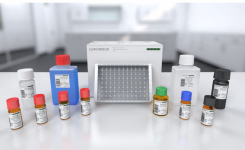Thermo Scientific Tests Help Labs to Diagnose Increasing Incidence of Syphilis
go back to news archives| | Thermo Scientific Diagnostic Reagent VDRL and TPHA Kits can provide laboratories with inexpensive, easy-to-perform and rapid tools for the diagnosis of syphilis - a disease the incidence of which continues to rise in the UK. |
| Following a House of Commons Health Committee Report in June 2003 that showed that the UK's sexual health services were in crisis(1), in September the government announced an extra £11m of funding for sexual health services(2). However, no funding was specifically allocated for microbiology and laboratory services or for diagnosis of the "traditional" STIs such as syphilis and yet rates of infection with this disease continue to rise. |
Source : Thermo Scientific. View archived contact details
Posted on January 28, 2004
















